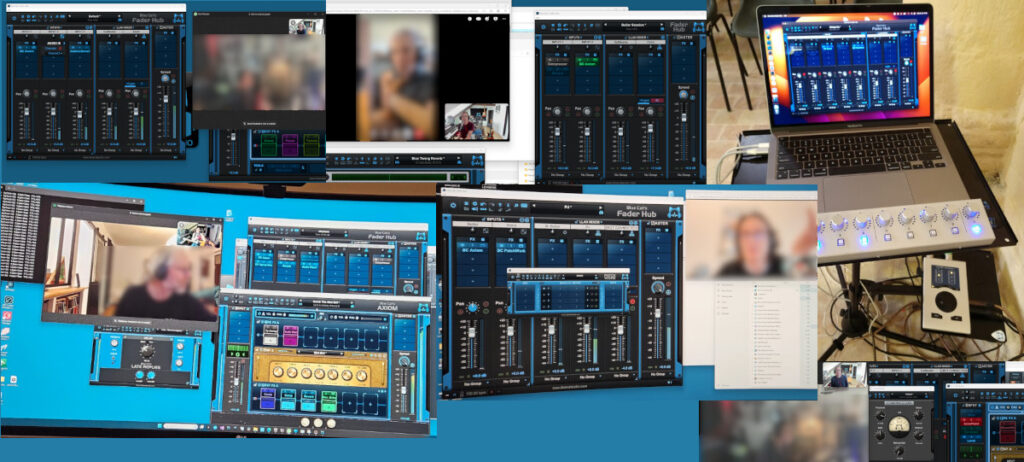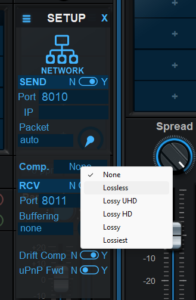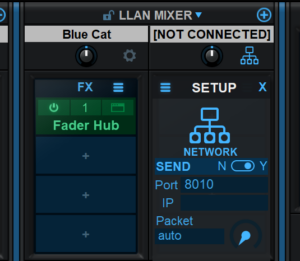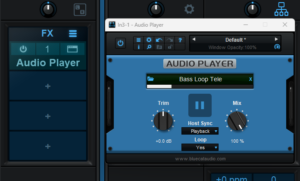Fader Hub, the peer-to-peer network mixing and streaming console was announced and demoed earlier this year at NAMM 2023, promising a revolutionary experience for musicians collaborating online or through local networks.
As we eagerly await the imminent release (yes, it’s coming…), let’s explore the exciting enhancements and optimizations that have been implemented over the past few months, making Fader Hub the ultimate tool for connecting musicians.
We have indeed used Fader Hub quite a bit since NAMM, for online or local sessions (even as standalone mixer, without network), and it appeared that it could be improved some more to reach our goal.

Latency Optimization & Estimation

As our understanding of long distance network connections and their issues for real-time audio improved, Fader Hub has undergone significant improvements in its network protocol, resulting in optimized latency for real-time audio transmission.
Our testing revealed astonishingly low latencies of 10 to 15 ms over a 400 km fiber connection, accompanied by minimal dropouts. It is more than 100 000 times faster than the speed of sound :-).
Additionally, the software now provides users with a latency estimation feature, offering insights into the network’s quality.
Reduced Bandwidth

To facilitate seamless collaboration with multiple musicians, Fader Hub now has audio data compression built-in, reducing the amount of data transmitted over the network (up to 10 times smaller).
This helps reducing jitter and thus contributes to reducing the latency of the connection overall. It also avoids using too much bandwidth when this is a concern.
As a consequence you can also connect with even more musicians without too much impact on the network!
Simplified Remote Connection

Universal Plug’n Play Internet Gateway protocol (UPnP IG) support, added to Connector 1.2, was also specifically developed with Fader Hub in mind.
Connecting from remote locations is now straightforward (manual configuration is not necessary anymore, in most cases).
More Busses and Audio Inputs
When it comes to audio inputs, “More is more”, right? Fader Hub now has 8 stereo input busses to connect more instruments locally, and it can manage up to 8 connections over the network.

So with groups of 8 musicians per location/room, it means that you can connect up to 64 musicians together over the network out of the box! It also means that it can be used as a personal mixing console, even when not connected to a network. Of course it is still perfectly suited for one-to-one connections as well.
Inputs Recording
With an expanded array of inputs, it was also worth adding the ability to record these sources individually, just like the network busses. That’s up to 16 tracks (+ the Master) that can be recorded simultaneously, and remixed later in any DAW.

It also means that Fader Hub can be used as a local multitrack recorder too!
Also A Plug-In

Originally announced as a standalone application, Fader Hub has evolved into a plug-in, seamlessly integrating with popular DAWs such as Pro Tools, Logic, Cubase, Ableton Live, Bitwig, Studio One, Reaper, Cakewalk, Garage Band, and more.
This integration allows musicians to connect with others directly from their recording sessions, opening up a world of possibilities for synchronous recording and collaboration.
Also, it means that Fader Hub can now load itself… Providing an infinite number of connections, if you are into “plug-inception”!
Audio Player

We also noticed that it can be very useful to load backing tracks when jamming over the Internet. So the Audio player plug-in initially developed for guitar players and the Axiom plug-in has been integrated into Fader Hub.
Just drag and drop files onto a plug-in slot in Fader hub, and play! It can be mixed with local or network sources and recorded on the master as well!
Target Release Date
Enough teasing…! When will this thing available? Well, Fader Hub 1.0 is now expected to land sometime in January 2024, right before the 2024 NAMM Show. So keep connected!
New Connector Preview!
One more thing… Most of these improvements (lower latency, audio compression, latency estimation, improved performance) are already available in a new Connector preview. If you are a proud owner of this plug-in, it’s time to explore the future of virtual collaboration – check it out!




